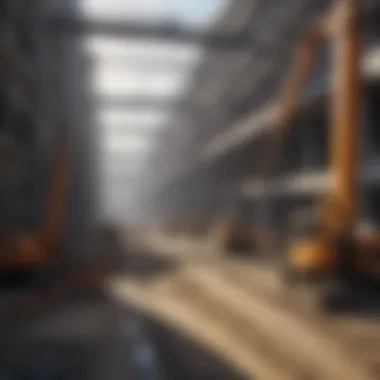Construction Companies Hiring: Trends and Insights


Intro
Topic Overview
Definition and Importance
Understanding which construction companies are hiring is essential for several reasons. First, it helps job seekers focus their efforts on companies that are expanding. Second, it provides insight into the industry’s growth areas. With ongoing developments in sustainable practices and new technologies, knowing where the demand lies can be advantageous for professionals.
Brief History and Evolution
Historically, the construction sector has seen cycles of boom and bust, influenced by economic factors. Over the past decade, there has been a marked shift toward projects that prioritize sustainability. This evolution highlights the industry's adaptation to changing regulations and public opinions on environmental impact. As a result, companies are increasingly looking for skilled workers to support these initiatives.
Current Hiring Patterns
The hiring landscape in construction is varied, influenced by geography and specific project needs. Some areas are experiencing strong demand due to urban development, while others are focused on infrastructure improvements. Notably, firms are searching for individuals with expertise in technology integration and sustainable building practices. This includes roles such as project managers, skilled tradespeople, and safety personnel.
"The construction workforce must evolve to meet not just current demands but also future needs, especially in areas promoting sustainability and innovation."
Key Skills Sought After
To narrow down the job market effectively, it is necessary to identify key skills that are currently in demand:
- Technical expertise in modern construction tools and methods
- Project management skills to oversee complex tasks
- Knowledge of sustainable building practices and regulations
- Safety certifications, which are increasingly required by law
Practical Applications
Step-by-Step Guides
Here are some steps to identify actively hiring construction companies:
- Research local construction industry reports to find trends and active projects.
- Utilize job boards specific to construction, such as Indeed and Monster, to see current openings.
- Visit company websites directly for careers sections, as many firms post jobs on their own platforms.
- Network within professional organizations, as these can provide insights about companies planning to hire.
Case Studies or Real-World Examples
Take, for example, the construction firm Turner Construction. They have been expanding their workforce due to several large-scale projects in urban areas. Their focus on sustainable methodologies has also attracted professionals with the right skill sets. Similar firms across various regions are framing their hiring strategies around environmental responsibility and innovation.
Overview of the Construction Industry Landscape
The construction industry serves as a critical backbone for economic development. In the current climate, understanding the nuances present in various segments of this industry is essential for job seekers. Businesses rely on construction firms to not only build infrastructure but also support the economy through job creation. Identifying which companies are actively hiring requires a look into broader industrial trends as well as specific corporate dynamics.
A primary focus is on the economic factors that impact hiring. These factors include government spending on public projects, housing market performance, and overall economic growth rates. As the economy grows, the demand for construction advances, leading to increased hiring in the sector. Conversely, economic downturns may stall projects and reduce job availability.
Furthermore, technological advancements reshape how construction companies operate and hire. Companies that adopt innovative tools and processes may prioritize different skill sets, thus opening various job roles that may not have existed prior. As the industry evolves, those aiming to join it must adapt to the new expectations fostered by technology and economic changes.
Current Economic Factors Impacting Hiring
Several economic factors currently influence hiring in the construction industry. Federal and state government investments often drive demand for construction labor. For instance, infrastructure bills lead to rapid employment in public works projects. These investments can serve as a robust indicator of which companies are positioned to grow and hire.
Additionally, the housing market's fluctuations directly relate to demand for construction services. As interest rates rise or fall, home buying trends shift, affecting residential construction volume. Thus, professionals must consider broader economic indicators—tracking metrics such as housing starts and permit approvals—to comprehend the dynamic landscape of the job market.
Technological Advancements and Their Influence
Technology significantly impacts how construction companies hire and operate. The increased use of Building Information Modeling (BIM), drones for site surveying, and automated machinery shifts the required skill set for prospective employees. Companies that adopt these technologies may seek candidates familiar with software or operational procedures that had minimal relevance years prior.
Moreover, technological uptake not only alters the skills sought after but influences hiring practices as well. Many construction firms utilize data analytics to forecast project needs and employee requirements, creating more informed hiring strategies. Those aspiring to enter or progress in the industry must keep abreast of technological innovation to remain competitive in this evolving market.
Understanding the Hiring Trends


Understanding hiring trends in construction is crucial for both job seekers and companies aiming to expand their workforce. An analysis of these trends reveals the evolving needs of the industry, shedding light on demand for specific roles and the skills desired by employers. This section highlights the intricacies of the hiring landscape, offering insights that can aid candidates in finding suitable opportunities and organizations in aligning their recruitment strategies.
Types of Roles in Demand
Job roles in construction reflect the sector's dynamic nature, shaped by various factors such as technology, project scope, and economic conditions. Each position plays a significant role and highlights specific skill sets and attributes that are increasingly valuable in today’s competitive climate.
Project Managers
Project managers oversee construction projects from initiation to completion. They are responsible for ensuring projects stay on schedule and within budget. A key characteristic of project managers is their ability to manage multiple stakeholders and resources efficiently. This role is quite beneficial in the context of this article as it encapsulates leadership, organization, and problem-solving skills that are crucial for project success.
The unique feature of project managers is their holistic view of projects. They balance technical knowledge with soft skills, making them effective communicators and decision-makers. However, the responsibilities can be demanding, leading to a high-stress environment.
Site Supervisors
Site supervisors play a critical role in overseeing daily operations on construction sites. They ensure safety protocols and standards are followed, which is vital for the smooth running of each project. The primary characteristic of site supervisors is their hands-on approach, which allows for close monitoring of work quality.
Their role is considered popular due to its direct impact on project outcomes. The unique aspect of site supervisors is their position as a bridge between the labor workforce and upper management. They facilitate communication and address challenges in real time, although their responsibilities can lead to long hours and varying work environments.
Skilled Laborers
Skilled laborers are at the heart of the construction workforce, performing essential tasks that require specific training or certifications. They often specialize in trades such as carpentry, plumbing, or electrical work. The distinctive feature of skilled laborers is their practical expertise, which is necessary for executing various construction tasks.
This role is in high demand as construction projects increasingly rely on specialized skills to meet quality standards. However, the work can be physically demanding and may require continuous training to keep up with changing technologies and safety regulations.
Temporary vs. Permanent Positions
The distinction between temporary and permanent positions is vital for job seekers to understand before pursuing opportunities. Temporary roles can provide valuable experience and networking opportunities. However, they often lack job security and may come with lower benefits. Permanent positions tend to offer stability, benefits, and the chance for career growth. Understanding these differences can help candidates align their job search with their career ambitions.
Key Companies Hiring in the Construction Sector
The construction industry is vast and varied. Understanding which companies are hiring can provide current and future employees with a clear pathway to job opportunities. This section is important as it sheds light on both national and regional players in this sector, giving insight into where the workforce is needed most and what roles are being filled. Knowing the specific companies and their hiring practices offers job seekers an advantage. They can tailor their applications more effectively and align their skills with employer expectations.
Major National Players
In the realm of construction, major national companies often dictate hiring trends. They have the resources and infrastructure to take on significant projects, leading to consistent recruitment. Companies like Turner Construction, Bechtel, and Kiewit are notable names that often look for skilled personnel across various roles. These firms not only provide a range of job opportunities but also promote stability and growth in the workforce.
Benefits of Working for Major National Players
- Job Security: Being part of a large organization generally means more stability.
- Diverse Opportunities: These companies operate on different projects nationwide, from commercial buildings to infrastructure.
- Career Advancement: They typically offer internal training programs and pathways for career growth.
- Competitive Salaries: National firms can often provide better pay and benefits compared to smaller companies.
Regional Construction Firms
Regional construction firms play a crucial role in local economies. They focus on projects that cater to the unique requirements of their area, ensuring that they can adapt to community needs. Companies like Mortenson Construction or Walsh Group may not have the same nationwide presence as larger firms, but they often contribute significantly to local hiring.
Considerations for Job Seekers
- Local Knowledge: Working for a regional firm allows candidates to leverage their understanding of local regulations and community needs.
- Flexibility: Smaller companies might provide more flexible work arrangements and a closer-knit work environment.
- Varied Responsibilities: Employees might find themselves wearing multiple hats, which can be an advantage in skill development.
- Community Impact: Roles in regional firms often have a visible impact on the community, providing a sense of fulfillment in one’s work.
"The construction hiring landscape is as diverse as the projects themselves. Both national players and regional firms present unique opportunities that cater to different career aspirations and lifestyle preferences."
In summary, identifying key companies hiring in the construction industry is pivotal for job seekers. Whether one is looking at major national players or exploring regional firms, understanding the industry’s landscape provides valuable insights into employment opportunities and career paths.
Geographic Distribution of Hiring
Understanding the geographic distribution of hiring within the construction industry is crucial for those looking to navigate career opportunities. This section identifies areas where demand for construction labor is highest, providing guidance for job seekers on where to focus their efforts. Factors such as economic growth, infrastructural development, and population shifts play a significant role in determining where hiring in construction is most active. Areas experiencing robust construction activity often present both opportunities and challenges for job seekers.
Rapidly Growing Urban Areas
Urban centers often serve as hotbeds for construction activity. Cities like Austin, Texas, or Seattle, Washington experience an influx of residents, leading to increased demand for housing, commercial buildings, and infrastructure improvements. This growth results in a surge in job vacancies. Employers in these areas tend to seek various roles, including project managers, skilled laborers, and site supervisors, to manage and oversee both small and large-scale projects.


The benefits of seeking employment in these urban areas are significant. Higher salaries often accompany the demand for skilled workers, and the variety of projects increases the potential for diverse experiences. In addition, larger firms, with the capacity to engage in more extensive work, frequently establish offices in urban environments, providing job seekers with multiple employment options.
However, job seekers must also consider the higher cost of living typically associated with these fast-growing cities. The balance of potential earnings and living expenses must be carefully assessed. Moreover, competition for roles can be fierce due to numerous applicants vying for the same positions. Applicants must emphasize their qualifications and unique experiences to stand out.
"Finding the right opportunity in a rapidly growing city involves not just the search for a job, but also aligning personal and professional goals with the local market's demands."
Rural Areas and Their Unique Opportunities
While urban areas dominate the hiring landscape, rural regions also offer unique opportunities for construction professionals. These locations may not be as bustling, but they can present exceptional avenues for growth and development. Rural areas often experience specific projects that cater to community needs, like agriculture-related buildings, residential developments, or infrastructure repairs.
Employers in these regions might require a more versatile workforce. Skills in general construction, alongside an understanding of local building codes and regulations, are highly regarded. The smaller, community-focused firms often emphasize reliability and craftsmanship, valuing workers who can handle various tasks on-site.
Despite the challenges associated with seeking employment in rural areas, such as limited job postings and fewer large companies, there are undeniable advantages. Generally, the cost of living in these locations is lower, which may enhance an individual's overall quality of life. Additionally, many rural projects tend to build close-knit teams, allowing for deeper relationships with co-workers and community members.
Skills and Qualifications Valued by Employers
The construction industry is a multifaceted sector, and the skills sought after by employers reflect this complexity. Candidates with the right mix of technical skills and soft skills are in high demand. For those exploring job opportunities, understanding the qualifications that enhance employability is essential. Employers prioritize both hard and soft skills to build effective teams, manage projects efficiently, and ensure safety on job sites.
Among the essential qualifications, one can identify a few key aspects that stand out. For instance, possessing technical skills can often be the differentiating factor in securing a job. Likewise, soft skills play a significant role in workplace dynamics and can influence hiring decisions.
Technical Skills Required
Construction Management Software
Construction Management Software has become an invaluable tool in today’s construction landscape. This technology streamlines processes and enhances communication across teams. Notably, software solutions like Procore and PlanGrid enable better collaboration and project tracking. Their key characteristic is the ability to integrate various aspects of project management, from scheduling to budgeting.
One unique feature of such software is its capacity for real-time updates. This functionality can lead to improved efficiency and fewer miscommunications among stakeholders. However, becoming proficient in these tools may require time and training, presenting a challenge for some job seekers.
Safety Certifications
Safety Certifications are crucial in the construction field. These certifications ensure that workers are knowledgeable about safe practices and regulations. They cover critical areas, such as fall protection, scaffolding safety, and hazardous materials handling. A common certification is OSHA (Occupational Safety and Health Administration) training, which focuses on workplace safety standards.
The primary benefit of obtaining safety certifications is the assurance it provides to employers regarding a candidate's commitment to safety. Many hiring firms will prioritize candidates with these certifications. One aspect to consider is that maintaining these certifications may involve periodic refresher courses, which could be an additional requirement for some candidates.
Soft Skills Encouraged in Candidates
In addition to technical skills, soft skills are increasingly essential in the hiring process for construction roles. These include effective communication, teamwork, adaptability, and problem-solving skills. As construction projects often involve various teams, being able to communicate well can prevent misunderstandings and delays.
Employers seek individuals who can actively listen and contribute to discussions. This ability fosters a collaborative environment, which is vital for project success. Furthermore, adaptability is important as projects can change rapidly due to several factors, such as weather conditions or new project requirements.
In summary, skills and qualifications are critical factors that dictate hiring trends in the construction industry. A combination of technical proficiency, such as familiarity with construction management software and safety certifications, alongside essential soft skills can significantly enhance a candidate's employability.
"In the evolving landscape of the construction industry, the emphasis on both technical and soft skills is more prominent than ever."
Understanding these requirements is paramount for aspiring professionals looking to carve a niche in this competitive field.
The Role of Sustainability in Hiring Decisions
The role of sustainability within the construction industry is increasingly impacting hiring decisions. Organizations are recognizing that sustainable practices are not just a trend but a necessity. These companies are actively looking for candidates who understand green building principles and can integrate them into their work.
Sustainability influences various aspects of hiring. First, it encourages more robust engagement with innovation in construction methods. Companies seek to develop eco-friendly designs and use materials that reduce environmental impact. This means professionals with qualifications in sustainable architecture and environmental science are becoming more valuable.
Additionally, sustainability training can be pivotal. Many firms are investing in educational programs aimed at managing waste and energy use without sacrificing quality. Such initiatives reveal a commitment to the environment, which can attract talent keen on sustainability. A workforce that is knowledgeable about sustainable practices not only aligns with industry trends but also elevates the overall performance of these companies.
In summary, sustainability in hiring is becoming central to a company's strategy. It enhances corporate responsibility and positions firms to remain competitive in the evolving market.
Trends Towards Green Building Practices
The shift towards green building practices is gaining momentum in the construction sector. Green building refers to constructing structures that are environmentally responsible and resource-efficient throughout their life-cycle. These practices are reshaping priorities for hiring.


Employers are emphasizing the need for knowledge in:
- Sustainable materials: Understanding which materials not only meet safety standards but also reduce the carbon footprint.
- Energy-efficient systems: Familiarity with technology that minimizes energy consumption is crucial.
- Water conservation techniques: Knowledge in systems that can reduce water usage is highly sought after.
This trend creates a demand for specific roles focusing on sustainability, including environmental engineers, quality control managers for green materials, and project managers specialized in sustainable sites. As the focus on sustainability intensifies, so does the necessity for skilled labor familiar with green practices.
Impact on Job Opportunities
The rising focus on sustainability significantly alters the landscape of job opportunities in the construction industry. Many construction companies that prioritize sustainable practices are experiencing growing demand for positions dedicated solely to this mission.
Companies that adopt green practices tend to expand their workforce in several areas, including:
- Construction site management: Supervisors who can implement and enforce sustainable practices.
- Design and planning: Architects and engineers who specialize in eco-friendly designs.
- Compliance roles: Experts who ensure projects meet environmental regulations.
This situation showcases the vital intersection of sustainability and job creation. As construction companies increasingly pursue sustainable initiatives, they contribute to economic growth while promoting environmental stewardship.
"Employers are now looking for candidates who not only know how to follow traditional construction practices but who can also innovate within the context of sustainability."
Keeping an eye on these trends and understanding how they translate into roles can prove beneficial for job seekers aiming to align with reputable companies. Whether through upskilling in sustainability or gaining experience with eco-friendly projects, emerging professionals are poised to seize opportunities as sustainability becomes a cornerstone of hiring in construction.
Resources for Job Seekers
In the current climate of the construction industry, having access to the right resources can be a determining factor for job seekers trying to navigate the myriad opportunities available. Understanding where to look for jobs and how to enhance one’s candidacy is essential for success. This section will explore the various resources that job seekers can utilize to gain an advantage in the competitive construction market.
Job Boards and Recruitment Agencies
Job boards are a direct line for candidates looking to find positions in construction. Websites such as Indeed, Monster, and Glassdoor offer extensive listings that can cater to diverse needs, from entry-level jobs to more advanced roles. Using relevant keywords specific to the construction sector helps filter the listings for better results.
Recruitment agencies also play a vital role in connecting candidates with employers. Agencies like Aerotek and Hays specialize in placement for construction jobs. They not only provide job listings but may also offer helpful services like resume reviews and interview preparations, which can boost a candidate’s chances in securing a job.
For those eager to differentiate themselves from the other applicants, visiting specialized job boards, such as ConstructionJobs.com, can provide tailored listings and a clearer view of industry-specific opportunities.
Networking Opportunities in Construction
Networking is an important aspect of job hunting that can often be overlooked. Cultivating professional relationships can uncover job openings that might not be advertised. This can include attending local industry events, trade shows, and seminars where construction companies present new projects and initiatives.
Connecting with professionals on platforms like LinkedIn can also create opportunities. Many hiring managers use LinkedIn to scout potential candidates. By being active and engaging with industry-related content, job seekers can raise their profile visibility.
Additionally, joining construction-focused groups on social media platforms like Facebook can provide insights into who is hiring and emerging trends in job openings.
"Many job opportunities in construction are filled through networking. Engaging with others in the industry can lead to direct job offers."
In summary, utilizing job boards, recruitment agencies, and networking opportunities are key strategies for job seekers. These resources can aid candidates in staying informed and gaining a competitive edge in the hiring market.
Forecasting Future Hiring Trends in Construction
Forecasting future hiring trends in the construction industry is essential for understanding the evolving landscape of job opportunities. As the sector adapts to changing economic conditions and technological innovations, knowing where the industry is headed can guide both companies and job seekers in their strategies. This section outlines significant factors influencing future hiring, which can lead to better decision-making for all stakeholders involved.
Emerging Technologies and Their Effect
Emerging technologies are reshaping how construction companies operate. Innovations such as Building Information Modeling (BIM), drones, and prefabrication are becoming standard. These tools not only streamline processes but also require a workforce skilled in using them. As technologies evolve, roles that once had a traditional focus are now shifting to require more technical expertise.
For example, with the increasing use of data analytics, construction companies will need professionals who can interpret data effectively. Similarly, automation in tasks may reduce the need for manual labor, while increasing demand for specialized roles in technology management.
This shift suggests a need for ongoing training and education within the workforce. Companies that invest in retraining their employees on these new technologies will likely have a competitive advantage in recruitment.
Long-term Industry Projections
Looking at long-term projections in the construction sector allows stakeholders to anticipate shifts in job availability and skills requirement. Analysts expect consistent growth in residential and commercial construction over the next decade, driven by urbanization and infrastructural development. This growth will likely create numerous job openings across various specialties.
Furthermore, as sustainability regulations become stricter, the demand for green building professionals will rise. Job seekers should focus on gaining knowledge in sustainable practices and certifications, as these will become increasingly essential.
In the next five to ten years, construction companies may also explore diversified hiring strategies to include more remote roles or roles requiring cross-disciplinary skills. Such changes could drive innovation within the sector and result in a more adaptable workforce.
"Anticipating changes in hiring trends not only prepares job seekers but also informs companies about how to align their growth strategies."



